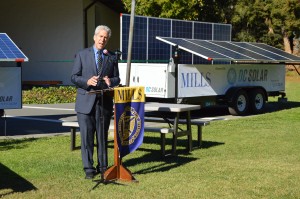
The Oakland Unified School District hosted its first speaker series for the 31st Annual Martin Luther King, Jr. Oratorical Fest last week. The annual event is run by OUSD.
Actor and youth activist Nate Parker spoke to educators and students about the importance of literacy and education for at-risk youth and how to create a more culturally responsible classroom.
“We are no greater than our weakest link, and we must realize that issues of literacy are bigger than our institution,” said Oratorical Event Director Andrea Gibson-Nobles when introducing Parker. Parker had been in Oakland earlier, visiting high school students in the area to talk about literacy and hear them rap about the issues they face. He has been promoting the positive messages from the 2007 biopic drama The Great Debaters, in which he starred as the rebellious, oratorical champion Henry Lowe.
“When I went to go see The Great Debaters, [the theater] was probably halfway full… there were no kids there, and it was really disturbing,” said Brian Favors, a teacher from Brooklyn, N.Y. “This is Denzel Washington playing a culturally competent teacher who was able to reach at-risk youth.”
The movie was directed by Washington, a veteran actor, who also starred in it. The film tells the story of the Wiley College debate team in 1930s Jim Crow Texas.
Parker plays one of three debaters who compete to win the competition against Harvard College. The movie aims to convey the importance of oratorical speech in the midst of interracial tensions, which Parker and Favors used to highlight the importance of cultural education in the U.S. to teens and educators.
“Nowadays, we go to college for us. We want to get ours,” Parker said to the audience about students who leave at-risk communities instead of helping provide educational and developmental growth on a local level. “It’s the great escape syndrome. We need people to be there.”
Parker spoke of the importance of having teachers who understand the issues of youth and who, instead of running away from horrible realities, “stand in the gap” of educational injustices to work with at-risk youth.
“Some of these teachers have all these degrees, and they can’t speak any truth or reality into that kid’s life,” he said, touching on the Melvin B. Tolson approach. Tolson, the debate coach Washington potrays in the film, responds to the unique, cultural needs of a specific group by using contemporary tools to educate.
“The school system needs to be a place where we can deal and talk about these issues. I guarantee you, if we filled this room with every at-risk youth in Oakland and we had this speech and then we had a dialogue, in the next quarter, things would change because, all of sudden, they would feel like ‘we matter,’ that people talk about us on not just as statistics,” he explained.
Parker encouraged the use of more culturally-responsible books and resources, as well as more educators that address the psychological trauma and oppression facing youth today.
At the event, Parker received the Martin Luther King Distinguished Beacon Award for his work addressing literacy in the United States. According to the Oakland Parents Literacy Project, 72 percent of third graders read below their grade level, and 17 percent of students are illiterate.
“Our children are a reflection of us, and when we get it right, they will get it right,” he said at the end of the speech.
Keturah Nobles Performs “Black Statistic” | Mills College from The Campanil on Vimeo produced by Melodie Miu.
Debate students from the Media College Preparatory High School attended the lecture and were in awe of the encouraging message Parker presented.
“I think his speech was very useful because, when he spoke, he touched on poverty in neighborhoods,” high school senior Brandon Sneed said. “It would be useful to use in my debate.”
The event was less publicized to the campus community and only a few Mills students attended.
“It was an inspiration. He kept it real,” sophomore Tymeesa Rutledge said. “It was sad a lot of the Mills community missed out.”
The Martin Luther King Oratorical Fest features poetry, essays, choral speeches and dramatic skits performed by students from kindergarten to the 12th grade. The competitions occur in the spring and finals took place the first weekend in March at Acts Full Gospel Church of God in Christ. Admission to the competition was free for students from all Oakland schools.

